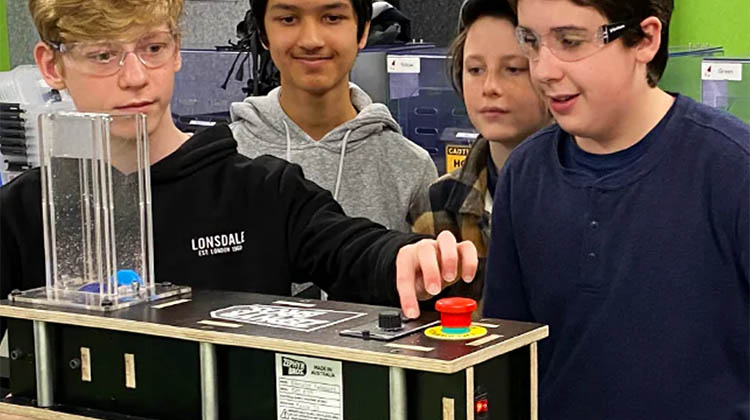Students Learn How to Reuse Plastic Waste

Plastic, it’s everywhere, from the seas to our bodies, plastic has found its way in and that is not good.
But we recycle, don't we? Sure, but we generate 3.4 million tonnes of plastic annually, and only 13% is effectively reused.
So, there is a long way to go before we’ve put a lid on plastic waste, but some schools are equipping kids with knowledge to find a way forward through a program from Precious Plastic Melbourne (PPM).
It’s a social start-up that has developed easy-to-use countertop Zephyr Bros plastic extrusion recycling machines and technologies, designed and built in Melbourne. The plastic extruded from waste, like bottle caps, can be repurposed in ways only limited by one’s imagination.
PPM work to set up micro-recycling communities and educate students about plastic recycling, making it fun and easy for teachers. They have now equipped over 50 schools across Australia with micro-recycling machinery, directly engaging 1,900+ students in environmental education.
Pip Macdonald, Head of Humanities at Coomera Anglican College in Queensland, is on board with PPM’s program.
“Our mission with implementing the Precious Plastic Program is to revolutionise education by offering students a hands-on journey through the entire recycling process - from collection and washing to product ideation, prototyping, and production.
“Supported by PPM, our program extends beyond theoretical learning to active participation and innovation within our college community. By repurposing single-use plastics into practical items, students not only learn valuable technical skills but also develop a deep-seated commitment to environmental stewardship and sustainable practices,” she says.
Through the PPM Program, Coomera Anglican College aims to cultivate a sense of responsibility and creativity among students, preparing them to become proactive global citizens who are equipped to address complex challenges through collaborative problem-solving and innovative thinking.
“This initiative exemplifies our commitment to redefining education, ensuring that our students not only understand sustainability but actively engage in shaping a more sustainable future. As we continue to expand this program, we are excited by the collaborative opportunities it presents for our students and community. Together, we are fostering a culture of creativity, resilience, and environmental consciousness, paving the way for a generation of leaders who will make a positive impact on our world.
“Coomera’s Humanities Faculty integrates this initiative into our geography and civics curriculum. This approach not only educates students on the environmental impact of single-use plastics but also empowers them to discover forward-thinking solutions to global problems.”
PPM’s program has enriched the STEM, design, business and manufacturing disciplines as well.
“Students apply scientific knowledge to optimise the recycling process, employ mathematical concepts to measure and refine prototypes, and harness technological tools to innovate sustainable solutions. There are also significant links to the Business curriculum in terms of process management, communication, marketing etc.
“Since its inception, the program has achieved remarkable outcomes. Students have not only gained practical knowledge of the recycling process but have also developed a profound understanding of environmental sustainability and the impact of plastic waste on our planet. This hands-on experience has sparked innovation and creativity among our students, encouraging them to explore solutions to real-world environmental challenges,” Macdonald says.
“In our Humanities and Geography classes, the program provides a tangible link to curriculum objectives by immersing students in geographical issues related to waste management, sustainable development, and global citizenship. It empowers them to critically analyse environmental policies and practices while fostering a sense of responsibility towards their local and global communities. Students actively engage in discussions on environmental justice, resource management, and the ethical implications of consumerism, aligning classroom learning with practical applications that extend beyond traditional academic boundaries.
“The curriculum link-up across Humanities, Design, STEM, Business and manufacturing underscores our commitment to holistic education. It enables students to connect theoretical knowledge with real-world applications, preparing them to become informed global citizens and future leaders in sustainability and innovation.”
Skills learned through the program are highly applicable to future careers in sustainability, engineering, design, and manufacturing. Students gain hands-on experience with equipment and processes essential to recycling and product development, preparing them for roles in environmental management, sustainable engineering, and innovative design.
Macdonald says students engaged in the program have provided enthusiastic feedback, highlighting their enjoyment and inspiration from the hands-on experience and creative opportunities it offers.
“They particularly appreciate witnessing waste materials swiftly transformed into practical items like pens, which not only demonstrates the power of recycling but also sparks their creativity. This immediate, tangible impact encourages them to explore innovative solutions to environmental issues.
“Moreover, students value the program's integration of STEM principles with design and manufacturing, equipping them with versatile skills applicable across various career paths. They emphasise the collaborative nature of the program, which enhances teamwork and communication skills essential for future endeavours.”